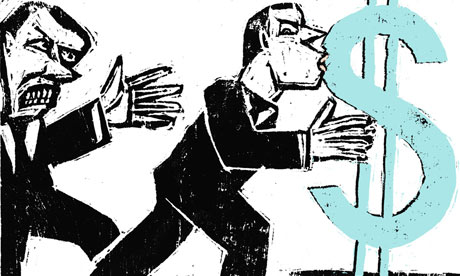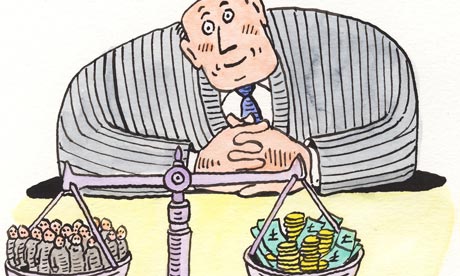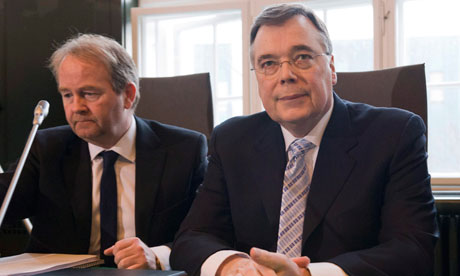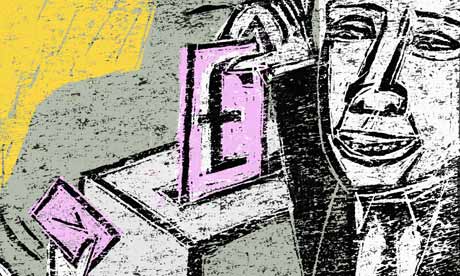Her psychopathic ideas made billionaires feel like victims and turned millions of followers into their doormats

Illustration by Daniel Pudles
Rand was a Russian from a prosperous family who emigrated to the United States. Through her novels (such as Atlas Shrugged) and her nonfiction (such as The Virtue of Selfishness) she explained a philosophy she called Objectivism. This holds that the only moral course is pure self-interest. We owe nothing, she insists, to anyone, even to members of our own families. She described the poor and weak as "refuse" and "parasites", and excoriated anyone seeking to assist them. Apart from the police, the courts and the armed forces, there should be no role for government: no social security, no public health or education, no public infrastructure or transport, no fire service, no regulations, no income tax.
Atlas Shrugged, published in 1957, depicts a United States crippled by government intervention in which heroic millionaires struggle against a nation of spongers. The millionaires, whom she portrays as Atlas holding the world aloft, withdraw their labour, with the result that the nation collapses. It is rescued, through unregulated greed and selfishness, by one of the heroic plutocrats, John Galt.
The poor die like flies as a result of government programmes and their own sloth and fecklessness. Those who try to help them are gassed. In a notorious passage, she argues that all the passengers in a train filled with poisoned fumes deserved their fate. One, for instance, was a teacher who taught children to be team players; one was a mother married to a civil servant, who cared for her children; one was a housewife "who believed that she had the right to elect politicians, of whom she knew nothing".
Rand's is the philosophy of the psychopath, a misanthropic fantasy of cruelty, revenge and greed. Yet, as Gary Weiss shows in his new book, Ayn Rand Nation, she has become to the new right what Karl Marx once was to the left: a demigod at the head of a chiliastic cult. Almost one third of Americans, according to a recent poll, have read Atlas Shrugged, and it now sells hundreds of thousands of copies every year.
Ignoring Rand's evangelical atheism, the Tea Party movement has taken her to its heart. No rally of theirs is complete without placards reading "Who is John Galt?" and "Rand was right". Rand, Weiss argues, provides the unifying ideology which has "distilled vague anger and unhappiness into a sense of purpose". She is energetically promoted by the broadcasters Glenn Beck, Rush Limbaugh and Rick Santelli. She is the guiding spirit of the Republicans in Congress.
Like all philosophies, Objectivism is absorbed, secondhand, by people who have never read it. I believe it is making itself felt on this side of the Atlantic: in the clamorous new demands to remove the 50p tax band for the very rich, for instance; or among the sneering, jeering bloggers who write for the Telegraph and the Spectator, mocking compassion and empathy, attacking efforts to make the word a kinder place.
It is not hard to see why Rand appeals to billionaires. She offers them something that is crucial to every successful political movement: a sense of victimhood. She tells them that they are parasitised by the ungrateful poor and oppressed by intrusive, controlling governments.
It is harder to see what it gives the ordinary teabaggers, who would suffer grievously from a withdrawal of government. But such is the degree of misinformation which saturates this movement and so prevalent in the US is Willy Loman syndrome (the gulf between reality and expectations) that millions blithely volunteer themselves as billionaires' doormats. I wonder how many would continue to worship at the shrine of Ayn Rand if they knew that towards the end of her life she signed on for both Medicare and social security. She had railed furiously against both programmes, as they represented everything she despised about the intrusive state. Her belief system was no match for the realities of age and ill health.
But they have a still more powerful reason to reject her philosophy: as Adam Curtis's BBC documentary showed last year, the most devoted member of her inner circle was Alan Greenspan, former head of the US Federal Reserve. Among the essays he wrote for Rand were those published in a book he co-edited with her called Capitalism: the Unknown Ideal. Here, starkly explained, you'll find the philosophy he brought into government. There is no need for the regulation of business – even builders or Big Pharma – he argued, as "the 'greed' of the businessman or, more appropriately, his profit-seeking … is the unexcelled protector of the consumer". As for bankers, their need to win the trust of their clients guarantees that they will act with honour and integrity. Unregulated capitalism, he maintains, is a "superlatively moral system".
Once in government, Greenspan applied his guru's philosophy to the letter, cutting taxes for the rich, repealing the laws constraining banks, refusing to regulate the predatory lending and the derivatives trading which eventually brought the system down. Much of this is already documented, but Weiss shows that in the US, Greenspan has successfully airbrushed history.
Despite the many years he spent at her side, despite his previous admission that it was Rand who persuaded him that "capitalism is not only efficient and practical but also moral", he mentioned her in his memoirs only to suggest that it was a youthful indiscretion – and this, it seems, is now the official version. Weiss presents powerful evidence that even today Greenspan remains her loyal disciple, having renounced his partial admission of failure to Congress.
Saturated in her philosophy, the new right on both sides of the Atlantic continues to demand the rollback of the state, even as the wreckage of that policy lies all around. The poor go down, the ultra-rich survive and prosper. Ayn Rand would have approved.




